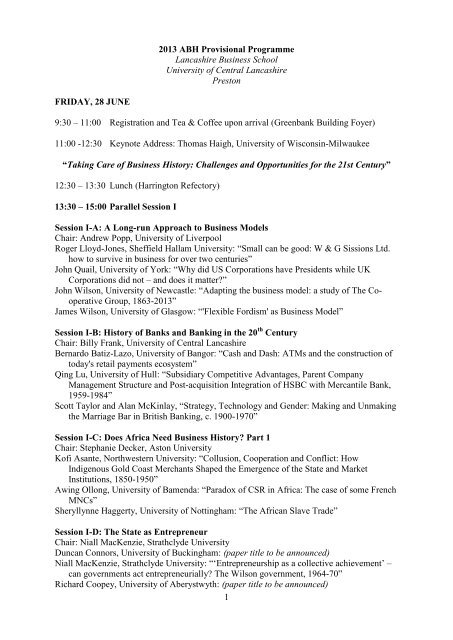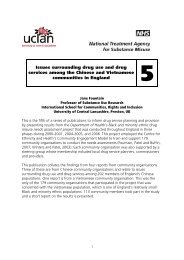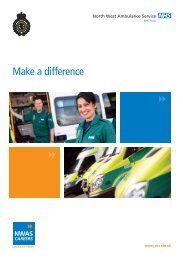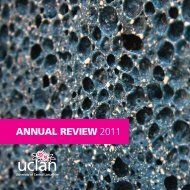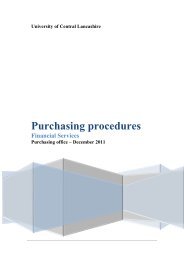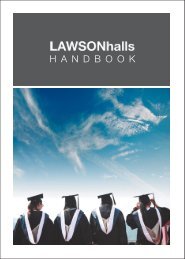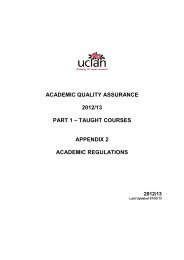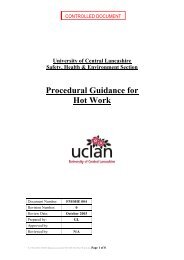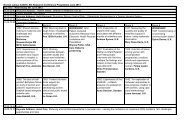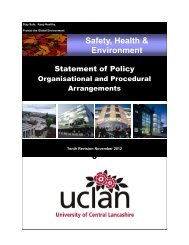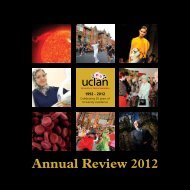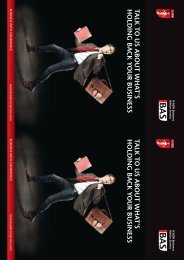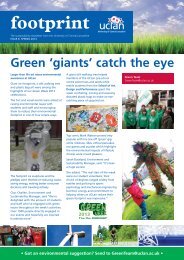2013 ABH Provisional Programme - University of Central Lancashire
2013 ABH Provisional Programme - University of Central Lancashire
2013 ABH Provisional Programme - University of Central Lancashire
You also want an ePaper? Increase the reach of your titles
YUMPU automatically turns print PDFs into web optimized ePapers that Google loves.
<strong>2013</strong> <strong>ABH</strong> <strong>Provisional</strong> <strong>Programme</strong><br />
<strong>Lancashire</strong> Business School<br />
<strong>University</strong> <strong>of</strong> <strong>Central</strong> <strong>Lancashire</strong><br />
Preston<br />
FRIDAY, 28 JUNE<br />
9:30 – 11:00 Registration and Tea & C<strong>of</strong>fee upon arrival (Greenbank Building Foyer)<br />
11:00 -12:30 Keynote Address: Thomas Haigh, <strong>University</strong> <strong>of</strong> Wisconsin-Milwaukee<br />
“Taking Care <strong>of</strong> Business History: Challenges and Opportunities for the 21st Century”<br />
12:30 – 13:30 Lunch (Harrington Refectory)<br />
13:30 – 15:00 Parallel Session I<br />
Session I-A: A Long-run Approach to Business Models<br />
Chair: Andrew Popp, <strong>University</strong> <strong>of</strong> Liverpool<br />
Roger Lloyd-Jones, Sheffield Hallam <strong>University</strong>: “Small can be good: W & G Sissions Ltd.<br />
how to survive in business for over two centuries”<br />
John Quail, <strong>University</strong> <strong>of</strong> York: “Why did US Corporations have Presidents while UK<br />
Corporations did not – and does it matter?”<br />
John Wilson, <strong>University</strong> <strong>of</strong> Newcastle: “Adapting the business model: a study <strong>of</strong> The Cooperative<br />
Group, 1863-<strong>2013</strong>”<br />
James Wilson, <strong>University</strong> <strong>of</strong> Glasgow: “'Flexible Fordism' as Business Model”<br />
Session I-B: History <strong>of</strong> Banks and Banking in the 20 th Century<br />
Chair: Billy Frank, <strong>University</strong> <strong>of</strong> <strong>Central</strong> <strong>Lancashire</strong><br />
Bernardo Batiz-Lazo, <strong>University</strong> <strong>of</strong> Bangor: “Cash and Dash: ATMs and the construction <strong>of</strong><br />
today's retail payments ecosystem”<br />
Qing Lu, <strong>University</strong> <strong>of</strong> Hull: “Subsidiary Competitive Advantages, Parent Company<br />
Management Structure and Post-acquisition Integration <strong>of</strong> HSBC with Mercantile Bank,<br />
1959-1984”<br />
Scott Taylor and Alan McKinlay, “Strategy, Technology and Gender: Making and Unmaking<br />
the Marriage Bar in British Banking, c. 1900-1970”<br />
Session I-C: Does Africa Need Business History? Part 1<br />
Chair: Stephanie Decker, Aston <strong>University</strong><br />
K<strong>of</strong>i Asante, Northwestern <strong>University</strong>: “Collusion, Cooperation and Conflict: How<br />
Indigenous Gold Coast Merchants Shaped the Emergence <strong>of</strong> the State and Market<br />
Institutions, 1850-1950”<br />
Awing Ollong, <strong>University</strong> <strong>of</strong> Bamenda: “Paradox <strong>of</strong> CSR in Africa: The case <strong>of</strong> some French<br />
MNCs”<br />
Sheryllynne Haggerty, <strong>University</strong> <strong>of</strong> Nottingham: “The African Slave Trade”<br />
Session I-D: The State as Entrepreneur<br />
Chair: Niall MacKenzie, Strathclyde <strong>University</strong><br />
Duncan Connors, <strong>University</strong> <strong>of</strong> Buckingham: (paper title to be announced)<br />
Niall MacKenzie, Strathclyde <strong>University</strong>: “„Entrepreneurship as a collective achievement‟ –<br />
can governments act entrepreneurially? The Wilson government, 1964-70”<br />
Richard Coopey, <strong>University</strong> <strong>of</strong> Aberystwyth: (paper title to be announced)<br />
1
15:00 – 15:15 Tea and c<strong>of</strong>fee break, Greenbank Foyer<br />
15:15 – 16:45 Parallel Session II<br />
Session II-A: The History <strong>of</strong> Cotton and Textiles<br />
Chair: Steve Toms, <strong>University</strong> <strong>of</strong> Leeds<br />
Valerio Cerretano, <strong>University</strong> <strong>of</strong> Glasgow: “Recessions, deflation and inward foreign direct<br />
investment: the case-study <strong>of</strong> the man-made fibres industry before the Second World<br />
War”<br />
Barbara Hahn, Texas Tech <strong>University</strong>: “Cloth Britannia: What Can the History <strong>of</strong><br />
Technology Add to the History <strong>of</strong> the Industrial Revolution?”<br />
Junko Watanabe, Kyoto <strong>University</strong>: “Response to the industrial decline: the case <strong>of</strong> Japanese<br />
cotton textile companies”<br />
Session II-B: Decision-Making in British Transportation<br />
Chair: Terry Gourvish, London School <strong>of</strong> Economics<br />
Roy Edwards, <strong>University</strong> <strong>of</strong> Southampton: “The Ministry <strong>of</strong> Transport and the British<br />
Railways: Conceptualising the Business Model for Freight Transport c1919 – 1947”<br />
Kevin Tennent, <strong>University</strong> <strong>of</strong> York: “Management and Competitive Advantage in the public<br />
transport industry – London County Council Tramways 1899-1933”<br />
David Turner, <strong>University</strong> <strong>of</strong> York: “Decision-making in the private railway industry - the<br />
quality <strong>of</strong> management on the London and South Western Railway 1870-1911”<br />
Session II-C: Doing Business (History) in Asia<br />
Chair: Shakila Yacob, <strong>University</strong> <strong>of</strong> Malaya<br />
Eugene Choi, Ritsumeikan <strong>University</strong>: “Automobile Manufacturing in South Korea:<br />
Hyundai-Kia”<br />
Ayub Mehar, Iqra <strong>University</strong>: “Financial Integration in South Asia: Limitations and<br />
Possibilities”<br />
Shigehiro Nishimura, Kansai <strong>University</strong>: “Patent management in China: a comparative<br />
approach to the newly emerging superpower”<br />
Session II-D: Delivering Pr<strong>of</strong>it? The Royal Mail and UK Public Sector Spending<br />
Chair: Duncan Connors, <strong>University</strong> <strong>of</strong> Buckingham<br />
Christian Richter and Dimitrios Paparas, <strong>University</strong> <strong>of</strong> East London: “The validity <strong>of</strong><br />
Wagner‟s Law in United Kingdom for the period 1850-2010”<br />
Michael Heller, <strong>University</strong> <strong>of</strong> East London: “The Development <strong>of</strong> Public Relations and<br />
Integrated Marketing Communications at the General Post Office, 1933-39. A Study in<br />
the Emergence <strong>of</strong> „Admass‟ in the United Kingdom”<br />
Remi Gilardin, European <strong>University</strong> Institute: “Business "performance" as a historical object:<br />
the case <strong>of</strong> the British Post Office, c. 1945-1970”<br />
16:45 – 17:00 Tea and c<strong>of</strong>fee break, Greenbank Foyer<br />
17:00 – 18:00 Parallel Session III<br />
Session III-A: The Company as the Unit <strong>of</strong> Analysis in Business History: Cadburys<br />
Chair: John Quail, <strong>University</strong> <strong>of</strong> York<br />
Emma Robertson, LaTrobe <strong>University</strong>: “„The sun never sets on the Cadbury and Fry<br />
flags…‟: Manufacturing work, place and gender in empire subsidiaries, 1920-1960”<br />
2
Vaughn White, <strong>University</strong> <strong>of</strong> York: “The Introduction and Development <strong>of</strong> Costing within<br />
the UK Confectionery Industry: The Experience <strong>of</strong> Cadbury 1899-1914”<br />
Session III-B: The History <strong>of</strong> Business Philanthropy<br />
Chair: Roy Edwards, <strong>University</strong> <strong>of</strong> Southampton<br />
Sarah Flew, Open <strong>University</strong>: “Corporate Philanthropy: the funding <strong>of</strong> Anglican Home<br />
Missionary Organisations in London, 1860 to 1914”<br />
Janette Rutterford, Open <strong>University</strong>: “Investing in companies in the nineteenth century: the<br />
financialisation <strong>of</strong> philanthropy”<br />
Session III-C: Does Africa Need Business History? Part 2<br />
Chair: Grietjie Verhoef, <strong>University</strong> <strong>of</strong> Johannesburg<br />
Takai Tetsuhiko, Hokkaido <strong>University</strong>: “Colonization & decolonization <strong>of</strong> business archives:<br />
a case <strong>of</strong> chambers <strong>of</strong> commerce in Algeria, Tunisia, Morocco, Senegal and Madagascar”<br />
Suzanne McCoskey, Frostburg State <strong>University</strong>: “Cashing-in on the Promised Land? African-<br />
American Emigration to Liberia in Search <strong>of</strong> Economic Opportunity”<br />
The Future <strong>of</strong> African Business History – general discussion by session participants<br />
18:00 – 19:00 Break<br />
19:00 – 20:00 Drinks Reception (supported by Taylor & Francis Publishing)<br />
20:00 – 22:00 Conference dinner<br />
SATURDAY, 29 JUNE<br />
8:30 – 15:00 Registration<br />
Tea / C<strong>of</strong>fee before first session (8:30-9:00)<br />
9:00 – 10:30 Parallel Session IV<br />
Session IV-A: History <strong>of</strong> 19 th Century Financial Institutions<br />
Chair: Mark Billings, <strong>University</strong> <strong>of</strong> Exeter<br />
Lucy Newton and Virginia Barnes, <strong>University</strong> <strong>of</strong> Reading: “Banks, branches and<br />
shareholders: the spread <strong>of</strong> joint-stock banking, 1826-1844”<br />
Roger Ryan, Independent Scholar: “Lost without trace? - East <strong>of</strong> England Bank 1835 to<br />
1864”<br />
Daniel Valentine, INSEEC Business School: “Explaining the Mystery <strong>of</strong> 1844: The story<br />
behind the Joint Stock Companies Act 1844”<br />
Session IV-B: Mass Media<br />
Chair: Mitch Larson, <strong>University</strong> <strong>of</strong> <strong>Central</strong> <strong>Lancashire</strong><br />
Candan Celik-Elmer and Mitch Larson, <strong>University</strong> <strong>of</strong> <strong>Central</strong> <strong>Lancashire</strong>: “Changing Values<br />
in American Magazine Advertisements, 1965-2005”<br />
Howard Cox, Worcester College Oxford, and Simon Mowatt, Auckland <strong>University</strong> <strong>of</strong><br />
Technology: “Machinations in Fleet Street: Roy Thomson, Cecil King, and the creation <strong>of</strong><br />
a magazine monopoly”<br />
Peter Miskell, <strong>University</strong> <strong>of</strong> Reading, and Marina Nicoli, Bocconi <strong>University</strong>: “For a Few<br />
Dollars More: Film Distribution in Italy, 1958-1971”<br />
Session IV-C: Panel 1 – Major Themes in Business History for the 21 st Century<br />
Chair: Ray Stokes, <strong>University</strong> <strong>of</strong> Glasgow<br />
3
Malcolm Pearse, <strong>University</strong> <strong>of</strong> New South Wales: “Meta-analysis, microanalysis,<br />
revisionists, counterfactuals and globalization: Recent trends that shape Business History<br />
in the 21st Century”<br />
Jeannette Strickland, Unilever Archive: “More Product, Less Process – improving access to<br />
the collections in Unilever Archives”<br />
Sheldon Gosline, <strong>University</strong> College London: “Some 21st century techniques for revealing<br />
19th century Business Practices”<br />
Session IV-D: Making Old New Again: Examining Unusual Forms <strong>of</strong> Business Activity<br />
Chair: Niv Horesh, <strong>University</strong> <strong>of</strong> Nottingham<br />
Michele Blagg, Kings College London: “Bandits and Bullion”<br />
Kami Fletcher, Morgan State <strong>University</strong>: “„We Should Get Our Business in Such Shape as to<br />
Make It Real Business‟: The Pr<strong>of</strong>essionalization <strong>of</strong> 19th Century African-American<br />
Cemeteries”<br />
Derek Janes, Gunsgreen House Museum/<strong>University</strong> <strong>of</strong> Exeter: “The most hazardous <strong>of</strong> all<br />
trades, that <strong>of</strong> a smuggler…is the infallible road to bankruptcy”<br />
10:30 – 10:45 Tea and c<strong>of</strong>fee break, Greenbank Foyer<br />
10:45 – 12:15 Parallel Session V<br />
Session V-A: British Business Overseas in the 20 th Century<br />
Chair: Rory Miller, <strong>University</strong> <strong>of</strong> Liverpool<br />
Philip Garnett, <strong>University</strong> <strong>of</strong> Durham, Simon Mollan, <strong>University</strong> <strong>of</strong> Liverpool, and Kevin<br />
Tennent, <strong>University</strong> <strong>of</strong> York: “The Transitory Period in British International Business,<br />
1950-1980: Evidence from the British Overseas Mining Sector”<br />
Andrew Smith, Coventry <strong>University</strong>: “Delayering the Workforce: HSBC in the 1960s”<br />
Rory Miller, <strong>University</strong> <strong>of</strong> Liverpool: “British Merchants on the West Coast <strong>of</strong> South<br />
America in the Inter-War Period: Growth, Survival and Failure”<br />
Session V-B: International Businesses<br />
Chair: Maria Haigh, <strong>University</strong> <strong>of</strong> Wisconsin-Milwaukee<br />
Julien Brault, Graduate Institute <strong>of</strong> International and Development Studies: “Soon we will<br />
bow before your Fountains: Oil Companies and Quota Development Policies in France<br />
from the 1920‟s to the 1970‟s”<br />
Armin Grunbacher, <strong>University</strong> <strong>of</strong> Birmingham: “Fostering social mobility and modernisation<br />
or supporting the restoration? The Bad Harzburger Akademie für Führungskräfte der<br />
Wirtschaft in the 1950s and 60s”<br />
Laurence Mussio, McMaster <strong>University</strong>: “Canadian Life Insurance and the great reforms <strong>of</strong><br />
the early 20th century”<br />
Session V-C: Panel 1 – Brands and Branding<br />
Chair: Howard Cox, <strong>University</strong> <strong>of</strong> Worcester<br />
David Bowie, Oxford Brookes <strong>University</strong>: “Storytelling, Myths and the Origins <strong>of</strong> Iconic<br />
Brands: a business history perspective”<br />
David Higgins and David Clayton, <strong>University</strong> <strong>of</strong> York: “„Buy British‟: a failed demand<br />
management policy in post-War Britain?”<br />
Teresa da Silva Lopes, Neveen Abdelrehim, and Bob Doherty, <strong>University</strong> <strong>of</strong> York: “Back to<br />
my Roots: Is Heritage Important in a Brand‟s Long-term Survival?”<br />
4
Session V-D: Panel 1 – Networks<br />
Chair: John Haggerty, <strong>University</strong> <strong>of</strong> Salford<br />
Bernardita Escobar, Universidad Diego Portales: “The cultural and economic features <strong>of</strong><br />
Businesses for Women: Chile in the 1870-1900s”<br />
Sheryllynne Haggerty, <strong>University</strong> <strong>of</strong> Nottingham, Mark Casson, <strong>University</strong> <strong>of</strong> Reading, John<br />
Haggerty, <strong>University</strong> <strong>of</strong> Salford: “Defending Trade: Or Not! Positive and Negative<br />
Relationships with a Network”<br />
Neil Rollings, <strong>University</strong> <strong>of</strong> Glasgow: “Networking between businessmen and government<br />
<strong>of</strong>ficials in post-war Britain”<br />
12:15 – 13:00 Lunch (Harrington Refectory)<br />
13:00 – 14:00 Annual General Meeting<br />
13:30 – 15:00 Parallel Session VI (note: this session begins before the end <strong>of</strong> the AGM)<br />
Session VI-A: Leisure Industries<br />
Chair: Peter Miskell, <strong>University</strong> <strong>of</strong> Reading<br />
David Clampin and Nick White, Liverpool John Moores <strong>University</strong>: “„Is it essential that a<br />
steamship company‟s poster must have a ship?‟ The fallibility <strong>of</strong> product specification in<br />
British shipping posters, c.1840 to c.1970”<br />
Alex Gillett and Kevin Tennent, <strong>University</strong> <strong>of</strong> York: “Why Save a Commercially<br />
Unsuccessful Pr<strong>of</strong>essional Football Club? The Case <strong>of</strong> Middlesbrough Football and<br />
Athletic Company Limited (MFC) in the 1980”<br />
Doaa Shohaieb, <strong>University</strong> <strong>of</strong> York: “Evaluating Marketing Strategies during Crisis: The case<br />
<strong>of</strong> Egyptian Hospitality Institutions”<br />
Session VI-B: 20 th Century British Business History<br />
Chair: Simon Mollan, <strong>University</strong> <strong>of</strong> Liverpool<br />
Mark Billings and Lynne Oats, <strong>University</strong> <strong>of</strong> Exeter: “Designing a business tax: Excess<br />
Pr<strong>of</strong>its Duty in the United Kingdom in World War One”<br />
Julie Bower, <strong>University</strong> <strong>of</strong> Birmingham, and Howard Cox, Worcester College Oxford:<br />
“Whitbread, the Whitbread Investment Company and protection from hostile bids”<br />
Stephen Sambrook and Ray Stokes, <strong>University</strong> <strong>of</strong> Glasgow: “Bringing rubbish into business<br />
history”<br />
Session VI-C: Business „Pre-history‟: business history before 1800<br />
Chair: Michael Heller, <strong>University</strong> <strong>of</strong> Westminster<br />
Mark Casson, <strong>University</strong> <strong>of</strong> Reading, Catherine Casson, <strong>University</strong> <strong>of</strong> Birmingham:<br />
“Entrepreneurship in Late Medieval England”<br />
Usha Sundaram and Edward Kasabov, <strong>University</strong> <strong>of</strong> Exeter: “An Institutional Account <strong>of</strong><br />
Governance Structures in the Early to Late Middle Ages Business History”<br />
Emily Buchnea, <strong>University</strong> <strong>of</strong> Nottingham: “Movement and Mobility in Transatlantic<br />
Business Networks: Evidence from the Eighteenth and Nineteenth Centuries”<br />
Session VI-D: Panel 2 – Networks<br />
Chair: Bernardita Escobar, Universidad Diego Portales<br />
Ayub Mehar, Iqra <strong>University</strong>: “Nexus <strong>of</strong> Economic Freedom, Migration and Trade<br />
Enhancement: Role <strong>of</strong> Cultural Similarities”<br />
Pedro Neves, Technical <strong>University</strong> <strong>of</strong> Lisbon: “Business groups and interlocking directorates<br />
at the end <strong>of</strong> Estado Novo regime”<br />
5
Alvaro Silva, Nova School <strong>of</strong> Business and Economics: “Business groups in Portugal, 1900-<br />
2010”<br />
15:00 – 15:15 Tea / C<strong>of</strong>fee break, Greenbank Foyer<br />
15:15 – 16:45 Parallel Session VII<br />
Session VII-A: History <strong>of</strong> Transportation<br />
Chair: Kevin Tennent, <strong>University</strong> <strong>of</strong> York<br />
John Killick, <strong>University</strong> <strong>of</strong> Leeds: “Critical Transport Innovations: The Origin <strong>of</strong> the Second<br />
US Transatlantic Packet Line in 1822”<br />
Guiliano Maielli, Queen Mary: “Explaining lock-in through the concept <strong>of</strong> hegemony:<br />
Evidence from the car industry”<br />
James Wilson, <strong>University</strong> <strong>of</strong> Glasgow: “The Portsmouth Block Mill: An On-going<br />
Investigation <strong>of</strong> its Operational Management”<br />
Session VII-B: British Empire and Business<br />
Chair: Stephen Sambrook, <strong>University</strong> <strong>of</strong> Glasgow<br />
Billy Frank, <strong>University</strong> <strong>of</strong> <strong>Central</strong> <strong>Lancashire</strong>: “„Banking on Empire‟: Decisions and<br />
Decision Makers in Britain‟s Post-War Colonial Development Planning, 1939–1954”<br />
Timo Särkkä, <strong>University</strong> <strong>of</strong> Jyväskylä: “The British paper trade and market regulation: from<br />
free trade Empire to the Common Market, 1861–1960”<br />
Vikram Visana, <strong>University</strong> <strong>of</strong> Cambridge: “Banks, Bonds, and Business: The Economic<br />
Thought <strong>of</strong> Dadabhai Naoroji”<br />
Shakila Yacob, <strong>University</strong> <strong>of</strong> Malaya, and Nick White, Liverpool John Moores <strong>University</strong>:<br />
“Malaysianisation and the British family-run business: the case <strong>of</strong> the Barlow Group in<br />
the 1970s and 1980s”<br />
Session VII-C: Panel 2 – Major Themes in Business History for the 21 st Century<br />
Chair: John Wilson, Newcastle <strong>University</strong><br />
Edward Kasabov and Usha Sundaram, <strong>University</strong> <strong>of</strong> Exeter: “Business History and its Place<br />
in the Social Sciences: A Contribution to Current Debates”<br />
Steve Toms, <strong>University</strong> <strong>of</strong> Leeds: “The genesis <strong>of</strong> management revisited: Boulton and Watt,<br />
Springfield Armory and <strong>Lancashire</strong> Cotton”<br />
Andrew Popp, <strong>University</strong> <strong>of</strong> Liverpool: “Enterprising Albion: Ideology, History, and<br />
Enterprise in 1980s Britain”<br />
Session VII-D: Panel 2 – Brands and Branding<br />
Chair: Teresa da Silva Lopes, <strong>University</strong> <strong>of</strong> York<br />
Susumu Harada, <strong>University</strong> <strong>of</strong> York: “A paradox <strong>of</strong> brand management: Why GAP has<br />
decreased its brand value from the late 1990s”<br />
Nur Suhaili Ramli, <strong>University</strong> <strong>of</strong> York: “Immigrant Entrepreneurs on World Successful<br />
Brands”<br />
Anders Sørenson, Copenhagen Business School: “<strong>Central</strong> Banks as National Symbols”<br />
6


